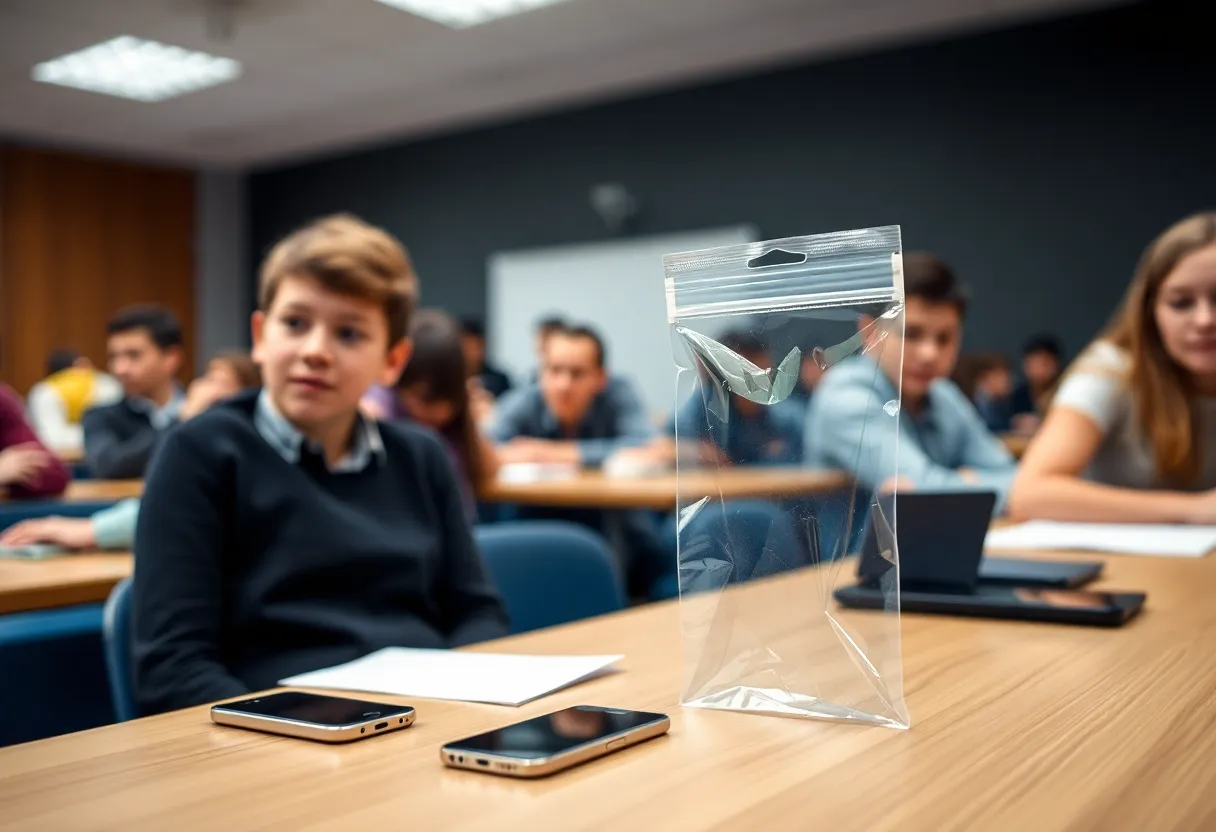News Summary
Massachusetts lawmakers are contemplating a ban on cellphones in schools to address concerns over mental health and distractions among students. Multiple proposals, including the ‘Study Act,’ aim to establish strict policies for cellphone usage throughout the school day. While some support the ban for enhancing learning, others express worries about safety and emergencies. Bipartisan support is emerging as discussions continue about balancing regulation with the need for student accessibility to their devices. The proposed measures could shape the future of cellphone policies in Massachusetts schools.
Boston, Massachusetts — Massachusetts lawmakers are actively considering a statewide ban on cellphones in schools as concerns mount over their impact on distractions and mental health among students. The initiative reflects a growing movement towards implementing stricter cellphone policies aimed at enhancing the educational environment.
Currently, there are more than half a dozen proposals under review at Beacon Hill, with various measures being formulated to curb cellphone usage during instructional time. Among these proposals is one named the “Study Act,” sponsored by the Massachusetts Attorney General, which includes support from the Massachusetts Teachers Association (MTA). This act advocates for a comprehensive ban on the use of personal electronic devices from the beginning to the end of the school day, often referred to as a “bell-to-bell” ban.
The MTA asserts that evidence from other districts demonstrates that a cellphone ban can have significant positive effects on the educational atmosphere. School districts such as Brockton, Methuen, and Lowell have already implemented varying degrees of cellphone restrictions, ranging from complete day-long bans to limited access during certain periods.
Reactions among students regarding cellphone restrictions are mixed. Some students believe that while cellphones should not be completely banned, they should be secured in lockers to minimize distractions. Conversely, many parents are voicing concerns about safety and accessibility during emergencies, advocating for policies that allow students to use their phones when necessary.
Senate President Karen E. Spilka emphasized the problematic nature of cellphone usage in educational settings. She identified distractions, cheating, and cyberbullying as primary issues related to smartphones in classrooms. Spilka underscored the need for an educational environment that safeguards and promotes students’ mental health.
At the national level, statistics reveal that at least 18 states in the U.S. have laws restricting cellphone use in schools, with 77% of schools across the country prohibiting cellphones. However, adherence to these regulations can vary, leading to inconsistent enforcement in many districts. The motivation behind the proposals in Massachusetts is heightened by a growing concern for children’s mental health, particularly in light of the influence of social media on young students.
The proposed legislation suggests utilizing strategies such as magnetic locking pouches for cellphones, a method already adopted by some schools that have received state grants to help minimize cellphone usage. The new measures would also empower individual school committees to create tailored cellphone policies, all while striving for a cohesive approach across the state.
Bipartisan support for these proposed bans emerges, with both Democratic and Republican leaders recognizing the need for regulations that address cellphone usage in schools. In addition to the cellphone ban, the proposals contemplate ongoing regulation of social media companies, especially focused on protecting minors. Suggestions include mandatory age verification systems and enhanced privacy settings to safeguard young users.
While there is significant momentum building for increased cellphone restrictions, critics argue that blanket bans could complicate students’ ability to reach out to parents in emergencies. As a result, there have been petitions against restrictive cellphone policies in various schools, highlighting the need for a balance between regulation and reasonable access for students.
In conclusion, Massachusetts is poised to explore and potentially implement new measures concerning cellphone use in public schools. As legislators continue their discussions, the growing awareness of the issues at hand and the need for a focused educational environment is expected to shape the future of cellphone policies in the state.
Deeper Dive: News & Info About This Topic
HERE Resources
Additional Resources
- CBS News: Cellphone Ban Proposals in Massachusetts Schools
- Google Search: Massachusetts cellphone ban in schools
- MassLive: Top Mass Senate Dem Floats Cell Phone Ban
- Wikipedia: Cell Phone Use in Schools
- NBC Boston: Cell Phones in Schools and Mental Health
- Encyclopedia Britannica: Cell Phone
- Boston Globe: Massachusetts Cellphone Ban in Schools
- Google News: Massachusetts schools cellphone ban
- Enterprise News: Brockton High School Cell Phone Policy
- Axios: Massachusetts Schools Cellphone Bans
- WBSM: Massachusetts Ban on Student Cell Phones
Author: STAFF HERE BOSTON WRITER
The BOSTON STAFF WRITER represents the experienced team at HEREBoston.com, your go-to source for actionable local news and information in Boston, Suffolk County, and beyond. Specializing in "news you can use," we cover essential topics like product reviews for personal and business needs, local business directories, politics, real estate trends, neighborhood insights, and state news affecting the area—with deep expertise drawn from years of dedicated reporting and strong community input, including local press releases and business updates. We deliver top reporting on high-value events such as Boston Marathon, Head of the Charles Regatta, and Boston Harborfest. Our coverage extends to key organizations like the Greater Boston Chamber of Commerce and Associated Industries of Massachusetts, plus leading businesses in finance, biotech, and insurance that power the local economy such as Fidelity Investments, Biogen, and Liberty Mutual Insurance. As part of the broader HERE network, we provide comprehensive, credible insights into Massachusetts's dynamic landscape.





